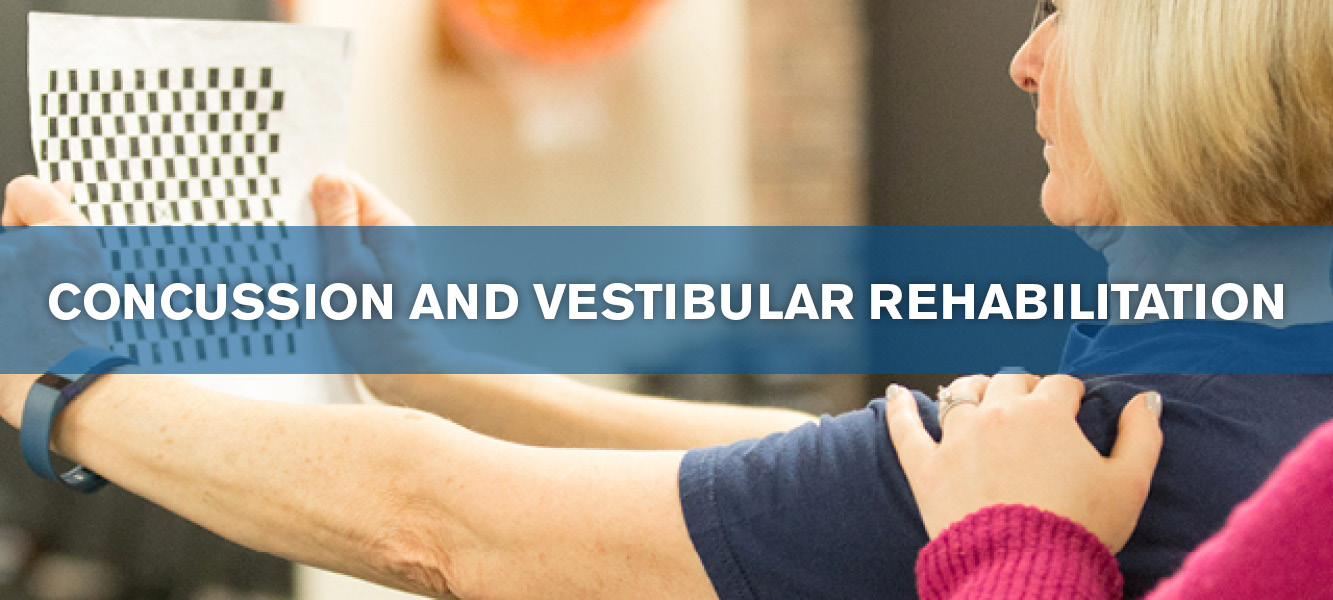How We Can Help
As a leader in vestibular and brain injury rehabilitation, we offer a variety of services to help you recover through the complex healing process and physical challenges that can occur after a head injury. Our clinicians specialize in vestibular rehabilitation, concussion management, and return to participation programs to help patients experiencing symptoms – including but not limited to dizziness, balance deficits, difficulty concentrating, headaches, and/or visual disturbances.
- Vestibular Disorders
- Concussions
- Concussion Return to Participation Protocols
- Post-Traumatic Headaches
Vestibular Disorders
The vestibular system connects the inner ear to the brain and helps control balance and eye movement. Diseases or injuries that damage this system can result in vestibular disorders, but they can also occur for unknown reasons. Our vestibular rehabilitation experts can evaluate and treat patients who suffer from symptoms that include:
|
Learn more about Vestibular Rehabilitation
Concussions
A concussion is a type of mild traumatic brain injury that is caused by a direct or indirect force to the head and neck. This sudden movement can cause stretching and disruption of brain cell membranes, causing an energy crisis within the brain. Symptoms of a concussion include, but are not limited to:
|
|
Concussions are considered to be mild traumatic brain injuries because it is not usually life-threatening. However, the effects of a concussion can be serious if not treated appropriately.
Because the brain is very complex, every concussion is different. This includes the presentation of symptoms and recovery time. Some symptoms may appear immediately, while others may not appear for hours or days. Sometimes, the injury makes it difficult for people to recognize or admit that they are having problems. Less than 5 percent of concussions cause a loss of consciousness. A loss of consciousness is not required for a diagnosis of concussion, nor is it related to recovery time. It’s important to watch for signs after the injury occurs. If you suspect someone has a concussion, we recommend going to the emergency room at the nearest hospital immediately.
Treatment for concussions can include vision and/or speech therapy, as well as physical therapy, occupational therapy, and athletic training services. Our team creates a custom treatment plan to help address and improve functional activities such as reading, processing information, and head/eye movements.
Individuals trying to return to participation (RTP) in sport, school, or work following a concussion may benefit from our concussion management and RTP programs. These programs are designed to reduce and manage post-concussion symptoms to help patients return to work, school, and play.
Learn more about Concussion Rehabilitation
Concussion Return to Participation Protocols
After sustaining a concussion, a return to participation (RTP) protocol should be used to safely progress a patient’s or athlete’s return to physical activity and athletic participation. This should be performed under the supervision of a qualified medical provider. Patients and athletes will not return to participation on the same day as a concussive event. Return to participation will occur once the patient or athlete is symptom-free at rest and exertion and has returned to their baseline state.
Learn more about Concussion Return to Participation Protocols
Post-Traumatic Headaches
Our headache specialists know how much cervicogenic, post-traumatic, and migraine headaches can disrupt a person’s quality of life. In addition to head pain, symptoms of headaches include:
|
Fortunately, physical therapy has proven to be successful in decreasing and/or resolving the intensity and frequency of headache symptoms, boosting function and mobility, as well as improving quality of life.
Learn more about Headache Rehabilitation
Schedule an Appointment
Scheduling an appointment is easy, convenient and flexible. We’ll schedule you fast, sometimes the same or next day, but always within 24 to 48 hours of requesting your first appointment.
Find a Head Injury/Vestibular Therapist Near You!
1. Meeshan W, d’Hemecourt P, Comstock D. High School Concussions in the 2008-2009 Academic Year: Mechanism, Symptoms and Management. Am J Sports Med. 2010; December; 38(12): 2405-2409. Doi: 10.1177/036354610376737
